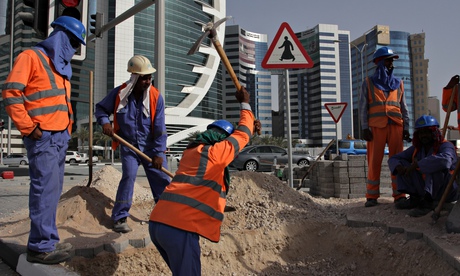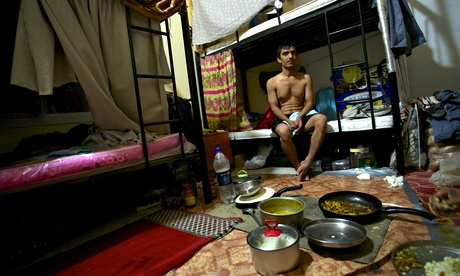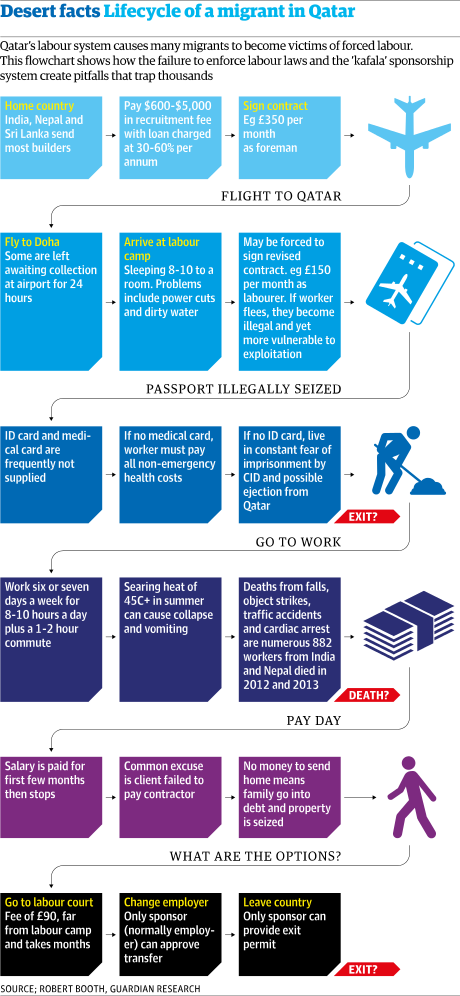Modern-Day Slavery – Qatar World Cup: Migrants Wait a Year to Be Paid for Building Offices
EXPOSURES - EXPOSÉS, MIDDLE EAST AND NORTH AFRICA, SPORTS, 4 Aug 2014
Robert Booth, and Pete Pattisson in Doha – The Guardian
Workers who fitted out lavish offices used by tournament organisers say they are trapped after collapse of contractor.
Link to video: Qatar World Cup worker: ‘I want to go home but I don’t have any money’
Monday 28 July 2014 –Migrant workers who built luxury offices used by Qatar‘s 2022 football World Cup organisers have told the Guardian they have not been paid for more than a year and are now working illegally from cockroach-infested lodgings.
Officials in Qatar’s Supreme Committee for Delivery and Legacy have been using offices on the 38th and 39th floors of Doha’s landmark al-Bidda skyscraper – known as the Tower of Football – which were fitted out by men from Nepal, Sri Lanka and India who say they have not been paid for up to 13 months’ work.
The project, a Guardian investigation shows, was directly commissioned by the Qatar government and the workers’ plight is set to raise fresh doubts over the autocratic emirate’s commitment to labour rights as construction starts this year on five new stadiums for the World Cup.
The offices, which cost £2.5m to fit, feature expensive etched glass, handmade Italian furniture, and even a heated executive toilet, project sources said. Yet some of the workers have not been paid, despite complaining to the Qatari authorities months ago and being owed wages as modest as £6 a day.
By the end of this year, several hundred thousand extra migrant workers from some of the world’s poorest countries are scheduled to have travelled to Qatar to build World Cup facilities and infrastructure. The acceleration in the building programme comes amid international concern over a rising death toll among migrant workers and the use of forced labour.
“We don’t know how much they are spending on the World Cup, but we just need our salary,” said one worker who had lost a year’s pay on the project. “We were working, but not getting the salary. The government, the company: just provide the money.”

Migrant workers from India in Doha, Qatar. The mistreatment of migrant workers, including the late or non-payment of wages, has attracted severe criticism. Photograph: Pete Pattisson for the Guardian
The migrants are squeezed seven to a room, sleeping on thin, dirty mattresses on the floor and on bunk beds, in breach of Qatar’s own labour standards. They live in constant fear of imprisonment because they have been left without paperwork after the contractor on the project, Lee Trading and Contracting, collapsed. They say they are now being exploited on wages as low as 50p an hour.
Their case was raised with Qatar’s prime minister by Amnesty International last November, but the workers have said 13 of them remain stranded in Qatar. Despite having done nothing wrong, five have even been arrested and imprisoned by Qatari police because they did not have ID papers. Legal claims lodged against the former employer at the labour court in November have proved fruitless. They are so poor they can no longer afford the taxi to court to pursue their cases, they say.
A 35-year-old Nepalese worker and father of three who ssaid he too had lost a year’s pay: “If I had money to buy a ticket, I would go home.”
Qatar’s World Cup organising committee confirmed that it had been granted use of temporary offices on the floors fitted out by the unpaid workers. It said it was “heavily dismayed to learn of the behaviour of Lee Trading with regard to the timely payment of its workers”. The committee stressed it did not commission the firm. “We strongly disapprove and will continue to press for a speedy and fair conclusion to all cases,” it said.
Jim Murphy, the shadow international development secretary, said the revelation added to the pressure on the World Cup organising committeeafter . “They work out of this building, but so far they can’t even deliver justice for the men who toiled at their own HQ,” he said.
Sharan Burrow, secretary general of the International Trade Union Confederation, said the workers’ treatment was criminal. “It is an appalling abuse of fundamental rights, yet there is no concern from the Qatar government unless they are found out,” she said. “In any other country you could prosecute this behaviour.”

A worker formerly employed on a project to fit out offices in the Al Bidda Tower who now lives and works illegally after the company that employed him collapsed and failed to pay him for a year. Photograph: Pete Pattisson for the Guardian
Contracts show the project was commissioned by Katara Projects, a Qatar government organisation under the auspices of the office of the then heir apparent, Sheikh Tamim bin Hamad al-Thani, who is now the emir. He also heads the supreme committee, the World Cup organising body. The committee is spending at least £4bn building new stadiums for the tournament, which has become mired in allegations of bribery, while there is disbelief at the prospect of playing the tournament in Qatar’s 50C summer heat.
Katara said it terminated its agreement with Lee Trading when it discovered the mistreatment of workers and non-payment of wages, and made efforts to repatriate those affected or find them new jobs. It said several workers had been compensated after court settlements. “If there are employees who were not repatriated, did not find employment or did not receive compensation, we would be happy to engage in any effort with the ministry of labour and ministry of interior to rectify the situation,” a spokesman said.
The problems at the Tower of Football workers are not isolated, despite Qatar’s pledges to monitor salary payments and abolish the kafala sponsorship system, which stops migrant workers changing job or leaving Qatar without their employer’s consent. In 2012 and 2013, 70 labourers from India, Nepal and Sri Lanka died from falls or strikes by objects, 144 died in traffic accidents and 56 killed themselves, the government’s own figures show. Dozens more young migrant workers die mysteriously in their sleep from suspected heart attacks every summer.
The Guardian discovered more projects where salaries had not been paid. They included a desert camp of 65 workers who had not been paid for several months, were sleeping eight to a room, and were living with dirty drinking water, filthy, unplumbed toilets and no showers.
Another group said they were being paid only sporadically, that there was sometimes no water in their housing and no electricity to power air conditioning.
This month, the Qatar Foundation, a state body, published a report examining trafficking, debt bondage and forced labour among migrant workers. It identified practices that contravene International Labour Organisation conventions on forced labour and UN anti-trafficking protocols, “widespread” non-payment of wages and bribery and extortion among recruitment agents and employers.
From January to May this year 87 Nepalese workers died in Qatar, a death rate two-and-a-half times higher than that of British ex, pats, new figures from the Nepal government reveal.
“We know there is much more to do,” said Abdullah al-Khulaifi, Qatar’s minister of labour and social affairs in a statement detailing progress on labour law reforms. “But we are making definite progress and are determined to build momentum.”
Go to Original – theguardian.com
DISCLAIMER: The statements, views and opinions expressed in pieces republished here are solely those of the authors and do not necessarily represent those of TMS. In accordance with title 17 U.S.C. section 107, this material is distributed without profit to those who have expressed a prior interest in receiving the included information for research and educational purposes. TMS has no affiliation whatsoever with the originator of this article nor is TMS endorsed or sponsored by the originator. “GO TO ORIGINAL” links are provided as a convenience to our readers and allow for verification of authenticity. However, as originating pages are often updated by their originating host sites, the versions posted may not match the versions our readers view when clicking the “GO TO ORIGINAL” links. This site contains copyrighted material the use of which has not always been specifically authorized by the copyright owner. We are making such material available in our efforts to advance understanding of environmental, political, human rights, economic, democracy, scientific, and social justice issues, etc. We believe this constitutes a ‘fair use’ of any such copyrighted material as provided for in section 107 of the US Copyright Law. In accordance with Title 17 U.S.C. Section 107, the material on this site is distributed without profit to those who have expressed a prior interest in receiving the included information for research and educational purposes. For more information go to: http://www.law.cornell.edu/uscode/17/107.shtml. If you wish to use copyrighted material from this site for purposes of your own that go beyond ‘fair use’, you must obtain permission from the copyright owner.
Read more
Click here to go to the current weekly digest or pick another article:
EXPOSURES - EXPOSÉS:
- WikiLeaks Has Just Put All Its Files Online--It’s All There!
- How the Opiate Conspiracy Widened
- Inside Israel’s Torture, Rape, and Dehumanization Centers [Sickening]
MIDDLE EAST AND NORTH AFRICA:
- Persia, Iran, and the Great Arab Mix-up: A Sarcastic Stroll through History to Today’s Messy War
- Will Israel Continue to Attack Iran until the International Community Approves the Eradication of Palestine?
- Crusade against Iran and the Complicity of Western Decadent Civilizations
SPORTS:
